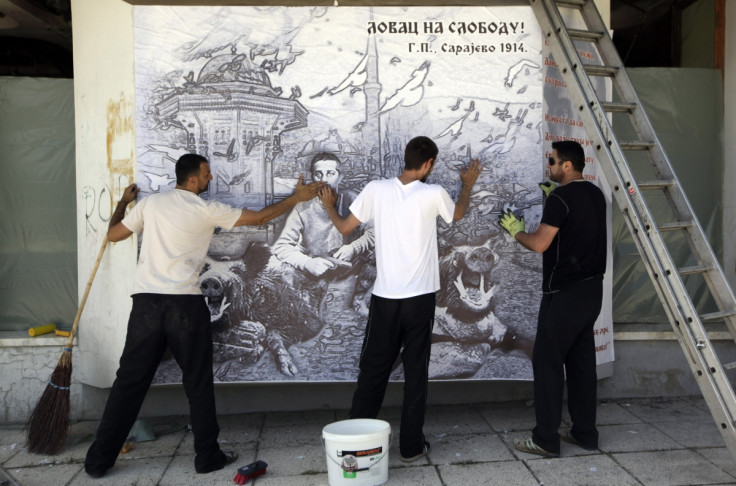Comment: Franz Ferdinand Assassin Gavrilo Princip is 'Propaganda Tool' for Bosnian Serbs

Serb leaders are boycotting commemorations in the Bosnian capital Sarajevo for the hundredth anniversary of the assassination of archduke Franz Ferdinand at the hands of Gavrilo Princip, a killing which triggered the catastrophic chain reaction leading to World War I.
IBTimes UK has asked Vera Katz, a researcher at the University of Sarajevo History Institute, to comment on the legacy of Princip, a polarising figure in Bosnia after the bloody 1992-1995 war and the Dayton Agreement that divided the country into two entities along ethnic lines: the Bosnian federation, formed predominantly by Muslims and Croats and the Serb-dominated Republika Srspka.
Sarajevo has gone mad over the commemoration of the centenary of the start of World War I. The figure at the centre of it all is Gavrilo Princip - as if he is all there is to our history - from which the one thing we have learned is that every 50 years it gives us a massive headache.
The centenary commemorations have deepened divisions in Bosnia and Herzegovina. The prevailing impression is that for all Bosniaks Princip is a murderer and terrorist, while for all Serbs he is a national hero. And [for Bosniaks] that then gets tied in to 1992-1995, the Greater Serbia project and the war of aggression against Bosnia and Herzegovina.
When Princip is described as fighting for the idea of Yugoslavia, this is linked to Milosevic and the type of Yugoslavia that he wanted to achieve. Of course, as far as the Serb perception is concerned, they take whatever suits the purpose of constructing a myth of heroism and resistance to occupying forces.
All the events organised in Sarajevo are seen in Republika Srpska as directed against the Serbs, although none of them is. For example, the concert given by the Vienna Philharmonic Orchestra is supposed to be a pro-Austrian gesture on the part of Sarajevo, and anti-Serb.
To put it simply, Republika Srpska has exploited Gavrilo Princip as a means of reinforcing its control over the population
The divisions are so great that no commemorative postage stamps have been issued to mark the centenary because the Bosnia and Herzegovina postal service couldn't agree. The subtext of all this is an effort to demonstrate that Bosnia and Herzegovina has no viable future as a nation state, the obvious conclusion from which is that Republika Srpska needs to secede in order to have any hope of economic prosperity.
The divisions are profound. From [Nebojša] Radmanović, a Member of the Bosnia and Herzegovina Presidency, down to the smallest farmer in Republika Srpska, everything is seen as targeted against the Serbs of Bosnia and Herzegovina.
It is all extremely frustrating. For example, Bosnia and Herzegovina, with its population of around 3.8 million, has five Academies of Sciences and Arts. Where else in the world do you have a situation like that?
To put it simply, Republika Srpska has exploited Gavrilo Princip as a means of reinforcing its control over the population. There are an enormous number of events taking place in Sarajevo, ranging from the very serious and relevant to some that cross the boundaries of good taste and enter the realm of kitsch.
The events in Sarajevo include some intended to distract local people from the severe economic crisis in which we find ourselves. Most ordinary people have been watching the World Cup and having a beer and know absolutely nothing about World War I, except that they're supposed to be for or against Gavrilo Princip.
Owen Beith has contributed to the translation of this article.
© Copyright IBTimes 2025. All rights reserved.




















